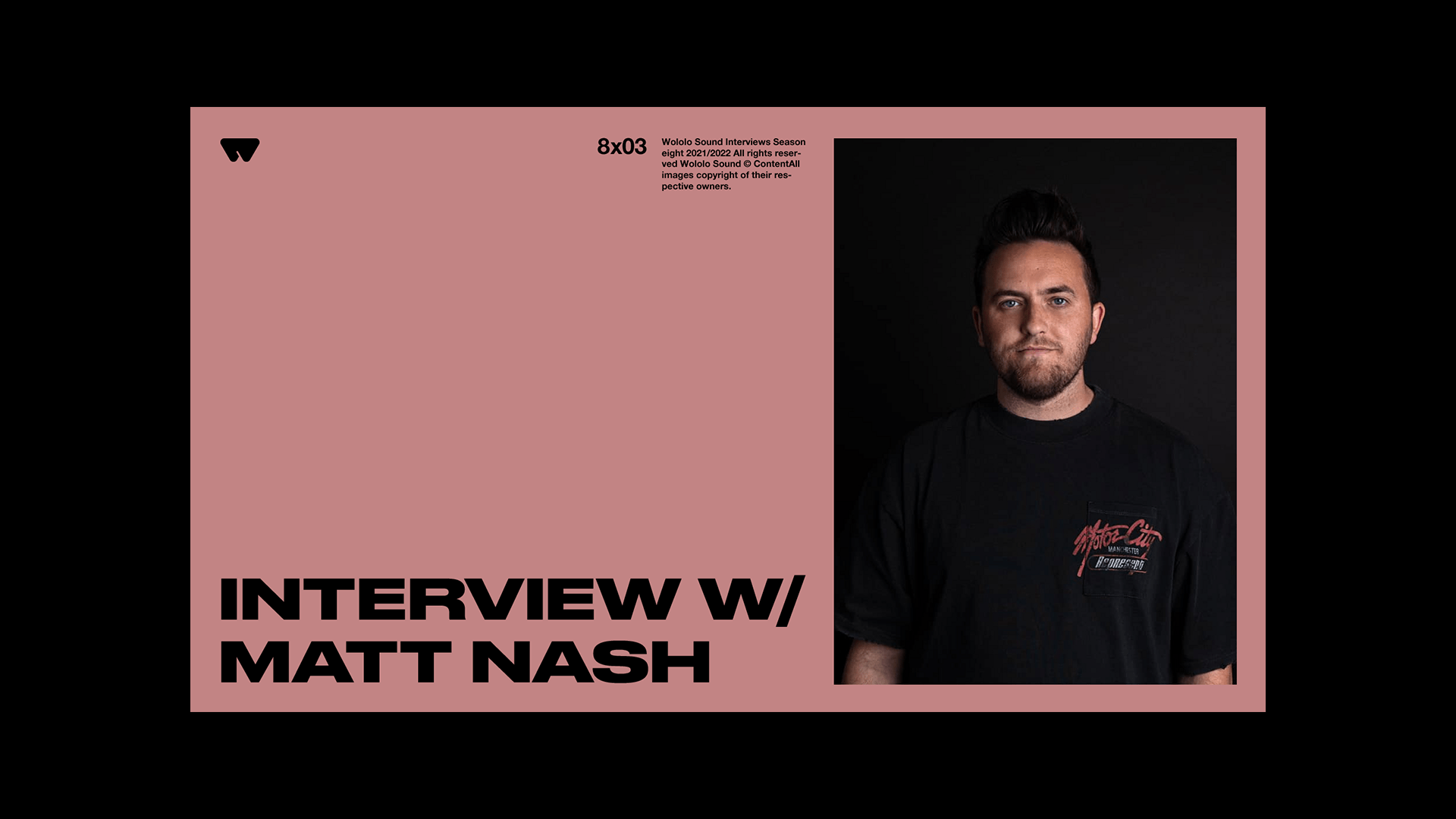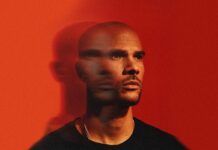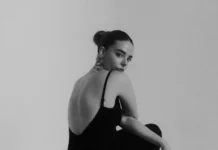La temporada de entrevistas sigue viento en popa y nuestro nuevo entrevistado es un DJ y productor inglés afincado en Ámsterdam. Wololo Sound entrevista a Matt Nash con motivo del lanzamiento de ‘Half Human’, su primer álbum de estudio, editado en STMPD RCRDS. Nos habla sobre su relación con el sello, el desarrollo de su sonido… ¡y mucho más!
Entrevista con Matt Nash / Interview with Matt Nash:
Wololo Sound: ¡Hola, Matt! Es un placer para nosotros poder entrevistarte. En primer lugar, espero que Gizmo y tú estéis bien en estos extraños momentos. Quiero comenzar la entrevista preguntándote por cómo estás llevando la situación del COVID, sin shows y más tiempo que nunca para estar en el estudio.
Matt Nash: Sí, creo que ha sido bueno en algunos aspectos. No poder estar de gira es un coñazo y es muy raro hacer música dance sin tener a nadie que baile con ella. Pero me ha dado mucho tiempo para centrarme en mi música y pensar más. Creo que lo mejor es que he podido hacer un álbum durante este tiempo.
Wololo Sound: Hello, Matt! It is our pleasure to get to interview you. First and foremost, I hope that Gizmo and you are safe and sound during these strange times. I would like to begin the interview asking how you are dealing with the COVID situation, without shows and getting more time than ever to spend in the studio.
Matt Nash: Yeah, I think it’s been good in some aspects. Not being able to tour is definitely a big bummer and it feels really strange making dance music when you don’t have people dancing to it. But it has given me a lot of time to focus on music and think harder. I guess the biggest upside is that I’ve been able to make an album during this time.
WS: Eres inglés, pero actualmente resides en Ámsterdam, donde se encuentran una gran cantidad de artistas y empresas de la industria musical electrónica. ¿Qué tal te fue con tu integración cuando llegaste? ¿Dirías que mudarte ha ayudado a que tu carrera evolucione con mayor rapidez y fluidez?
MN: De hecho me mudé hace cinco años. Viví en Ámsterdam al principio y ahora vivo fuera de la ciudad, a diez minutos. Aquí se está un poco más tranquilo, tengo un estudio grandecito y tal. Sobre la otra pregunta, es difícil porque creo firmemente que puedes estar en cualquier sitio haciendo música y si es buena, las cosas pasarán. Pero en cuanto a establecer contactos, trabajar con STMPD… Pienso que estar aquí ha ayudado. Me permitió ir a la oficina, tener reuniones con el sello y todo eso. Es una parte muy buena, pero no creo que sea esencial; se puede hacer desde cualquier lugar.
WS: You are from England, but you are currently living in Amsterdam, a place where you can find a lot of artists and companies related to the Electronic Music industry. How was your adaptation when you got there? Do you think moving there has helped your career to grow faster and more fluently?
MN: I actually moved five years ago now. I lived in Amsterdam to begin with and now I live outside Amsterdam, just ten minutes away. Just a little bit more quiet here, I’ve got a big studio and stuff like that. About the other question, that’s a tough one because I firmly believe that you could be anywhere making music and as long as the music’s good, things will happen. But I think, you know, building relationships, getting to work with STMPD… I think that definitely did help me being here, made me able to go to the office, have meetings with the label and stuff like that. It is a nice part of it but I don’t think it’s essential, it can be done from anywhere.
WS: Hace ya año y medio desde que hiciste tu debut en STMPD RCRDS con ‘Lose It All’, un tema que reafirma tu apuesta por una mezcla entre el future y el progressive house. Ahora ya tienes un álbum completo firmado en este sello. ¿Cómo fue tu primer contacto con Martin Garrix y su equipo para que firmasen esta canción?
MN: Fue un poco como un bonito accidente. Envié ‘Lose It All’ al sello y Martin estaba preparando un directo que era en medio de la cuarentena. Y el set se llamaba ‘Dutch Waters’, porque era básicamente en un barco en unos canales holandeses y tal. Terminó pinchando el tema incluso antes de que se firmara, a partir de ahí fichamos con STMPD y lo pasamos muy bien trabajando en él, así que decidimos firmar un acuerdo más largo. Empezamos a lanzar más y entonces, finalmente, seguimos adelante y decidimos lanzar el álbum.
WS: It’s already been a year and a half since you made your debut in STMPD RCRDS with ‘Lose It All’, a tune that reaffirmed your will to mix Future and Progressive House. Now you have a full album signed in this label. How was your first contact with Martin Garrix and the team right before you signed the song? And how would you describe the experience of working with them all this time?
MN: It kind of happened as a nice accident. I sent ‘Lose It All’ to the label and Martin was preparing this livestream which was right in the middle of lockdown times. And the set was called “Dutch Waters”, because it was basically on a boat over some Dutch canals and stuff. He ended up playing the song there before we even signed it and from there we basically signed the track with STMPD. We really enjoyed working together on that track so we decided to get on a longer deal. We started releasing more and then, eventually, we went ahead and decided to release an album.
WS: Para aquellos productores que están empezando y que tienen a STMPD como meta, ¿cómo describirías la experiencia de trabajar con ellos todo este tiempo?
MN: Diría que es muy buena. Entiendo por qué es un sello con el que todos quieren trabajar. He trabajado con muchos sellos distintos, desde Spinnin’ hasta Hexagon, Armada… Y me siento mucho más libre creativamente en STMPD porque ellos apoyan tu visión. Quiero hacer las cosas de una manera, visual y musicalmente, y ellos lo apoyan, lo cual es raro de ver hoy en día.
WS: For those producers who are getting started and have STMPD as a main goal in the future, how would you describe the experience of working with them all this time?
MN: I’d say it is a very good one. I understand why it’s a label that everyone aims to work for. I’ve worked with many different music labels, everywhere from Spinnin’ to Hexagon, to Armada… And I feel much more creatively free in STMPD because they support your vision. I wanna do things in some way, visually and musically, and they support that, which is quite rare to see these days.
WS: Has mencionado a Hexagon, sello de Don Diablo, con quien mantienes una estrecha relación desde que lanzasteis vuestro famoso ‘Starlight’ hace años. ¿Puedes hablarnos del impacto que tuvo este track para impulsar tu carrera?
MN: Tuvo un impacto bastante fuerte. Fue el primer tema que tuvo ímpetu y todo empezó a ir hacia arriba. Y eso ayuda mucho. Cuando hicimos esa colabo, Don no era el artista Top10 DJ Mag que es hoy. Ambos teníamos hambre de éxitos constantemente. Me ayudó a empezar y a que la gente reconociera quién soy. Fue mi primera dosis de éxito en la música electrónica.
WS: You just mentioned Hexagon, Don Diablo’s label, with whom you have had a close friendship since you released your massive ‘Starlight’ some years ago. Could you please tell me how that track impacted your career?
MN: It definitely had an impact. It was the first track that really got momentum and it all started going. And that’s super helpful. Back when we did that collab, Don was not the Top10 DJ Mag artist he is now. We were both hungry for it at the time. It helped me get started and people recognise who I am. It was my first taste of success inside dance music.
WS: He hecho un repaso rápido y tienes ya un total de seis canciones firmadas en Hexagon, pero siempre buscas no acomodarte en un mismo label y has escogido otros como Spinnin’ Records o Release Records recientemente. ¿Te resulta difícil encontrar lugar para tus canciones teniendo en cuenta que el boom de estos estilos por los que apuestas, el future house y el progressive house, ya pasó hace unos años?
MN: Creo que el future house no es lo que más fuerte está ahora, pero aún tiene espacio. Depende de los artistas que quieran hacerlo y de que lo mantengan fresco y emocionante, que lo sigan llevando hacia adelante. Porque si seguimos haciendo lo mismo que hace cuatro años, no va a funcionar. Hay que seguir innovando, pero tampoco voy a hacer lo que lo esté petando ahora. No voy a seguir modas y me voy a mantener firme a mi visión artística.
WS: I have checked that you have a total of six songs signed on Hexagon, but you refused to get comfortable with just one label and ended up in others like Spinnin’ Records or Release Records lately. Is it difficult to find a home for your music keeping in mind that the highest moment of these genre, future house and progressive house, was a few years ago?
MN: You know, I think future house isn’t the hardest sound right now but there is a space for it. It’s down to the artists who want to make it to keep it fresh and exciting, and to keep pushing it forward. Because if we keep making the same stuff from fours years ago it won’t work. You have to keep innovating. But at the same time, I’m not gonna go and make what’s hard right now. I’m not gonna chase the trend and I’m gonna stay true to my vision.
WS: En temas como ‘Future’, ‘Closer’, ‘With Me’ o ‘Universe’, en cambio, tomaste la decisión de realizar el lanzamiento de manera independiente. ¿Fue un reto personal para comprobar qué alcance podías tener por ti mismo o porque nadie confiaba en ellos pero tú creías que funcionarían?
MN: Creo que un poco de ambas. Los sellos no estaban particularmente emocionados con estos temas, pero yo aún creía que eran muy buenos. Creo que está bien ver qué puede hacer uno mismo; es una parte importante. No puedes depender siempre de los sellos y a veces tienes que mantenerte en pie. Fueron oportunidades para hacerlo. ¡Y ‘Universe’ y ‘With Me’ han funcionado genial! Han ido muy bien y me alegro mucho de haber hecho eso. Es algo que probablemente haga en el futuro cuando sea el momento idóneo.
WS: Despite that, in tracks like ‘Future’, ‘Closer’, ‘With Me’ or ‘Universe’ you chose to release them on your own. Was it because you wanted to challenge yourself to see what was your own reach or was it because others thought those tracks wouldn’t work but you believed in them?
MN: I think it was a bit of both. The labels weren’t particularly excited about them, but I still thought they were really great. I think it’s good to see what you can do by yourself. I think it is a very important part to do, you can’t always rely on the labels and you have to stand on your feet sometimes. Those were some opportunities to do that. And ‘Universe’ and ‘With Me’ did amazing! They did so well, I was super happy that I did that. It’s probably something I’ll do more when the times is right.
WS: Aunque todo el mundo tiene un sonido que le identifica, la música evoluciona y cambia constante y rápidamente. ¿Cuál dirías que es el siguiente paso en la dirección de la carrera de Matt Nash tras lanzar ‘Half Human’? ¿Hay alguna futura colaboración o trabajo en solitario que nos puedas adelantar en exclusiva?
MN: Musicalmente, no estoy seguro. Tardé mucho en ensamblar este álbum así que probablemente me tome un respiro para no hacer música o simplemente experimentar más, sin el objetivo de acabar temas, sino de jugar con sonidos. De todas formas, tengo otros temas listos porque al fin y al cabo me encanta hacer música, así que no voy a parar.
Es difícil averiguar qué será lo próximo. Es difícil porque el álbum ha salido este mes, así que aún está fresco en mi mente. Pero sí, tengo colaboraciones en camino que van a ser interesantes, así que estoy bastante expectante por el futuro, por supuesto.
WS: Even though everyone has a sound that represents them, music evolves and changes constantly. What would you say it’s Matt Nash’s next step after closing this era of ‘Half Human’? Is there any upcoming collaboration or single that you can share with us?
MN: Musically, I’m not really sure. It took a lot of me to get this whole album together, so I’m probably gonna have a bit of time of not making music or just more experimentation, not with the goal to get music done but to sort of playing around with sounds. I’ve got other songs already done anyway because I love making music at the end of the day so I’m not gonna stop.
It’s hard to figure out what’s next. It’s hard for me to say because the album came out this month so it is still very fresh in my mind. But yeah, I have some collabs on the way which are gonna be insteresting, so I’m excited about the future for sure.
WS: Durante los últimos meses también has estado trabajando en una masterclass digital para productores. ¿Cómo han sido la acogida y el resultado final?
MN: La masterclass que hice la empecé alrededor del final del año pasado. ¡Cogí más o menos 150 productores que se unieron a mí y fue la leche! Me encantó toda la experiencia porque mientras que la mayoría se graba vídeos enseñando cómo producir y ya, en la mía le enseñaba a la gente cómo produzco y también hacía directos solo para mis estudiantes en los que escuchaba música y les daba el mayor feedback posible.
Ha sido genial porque algunos de los que han venido a mis clases ya han emprendido el camino. Les he dado una crítica para sus temas y ahora los están lanzando en sellos en los que he lanzado mi música, lo cual es algo muy bueno desde el punto de vista de un productor.
WS: During the last few months you’ve also been working on a digital masterclass for producers. How was it received and what was the final result?
MN: The masterclass I did, I started it around the end of last year. I took around 150 different producers who joined me and it was so much fun! I really enjoyed the whole experience, because while most people just record videos teaching people how to produce and that’s it, mine is I recorded videos showing people how I produce and I also did livestreams regularly just for my students, where I would listen to their music and give them feedback as much as I could.
It’s been really nice because some people that are coming to my masterclass they have taken the course. I’ve fedback their songs and then they are releasing them in the same labels where I have released my songs, which is very nice to see as a producer.
WS: Estoy seguro de que tarde o temprano volveremos a encontrarnos en las pistas de baile. Hace dos años visitaste nuestro país para actuar en la Arcadia Night de Jose de Mara y Crusy. ¿Qué recuerdos te llevaste de aquella fiesta y del público de España? ¿Hay algún club o festival español del que hayas oído hablar y en los que te gustaría actuar?
MN: ¡Me acuerdo de esa noche! ¡Fue la hostia! Cada vez que vengo a España la gente es muy amigable: quieren charlar, salir de fiesta… Lo primero que se me viene a la cabeza es a la gente cantando los temas, no solo las vocales, sino las melodías. Fue genial.
También pinché en un festival español hace ya bastante. ¿Marenostrum? Estuvo muy bien, me encantaría pinchar de nuevo allí.
WS: I’m sure that sooner or later we will meet again on the dancefloors. Two years ago, you visited our country to perform at the Arcadia Night from Jose de Mara and Crusy. What are your memories from that night and the Spanish crowd? Is there any Spanish club or festival that you have heard about and would love to perform in?
MN: I can remember that night! It was so much fun! Every time I come to Spain the crowd is so friendly: they wanna come talk, they wanna hang out… First thing that comes to my head straightaway is the crowd with sing-alongs, not only to the vocals for my songs, but also the riffs. It was so much fun, man.
I played a Spanish festival quite a while ago… Marenostrum? That was fun, I’d love to play that one again.
WS: Para finalizar, vamos con una ronda de preguntas cortas:
WS: Club favorito en el que hayas pinchado. // MN: Creo que voy a ir con Ministry of Sound, en Londres.
WS: Ciudad o país en el que te gustaría actuar algún día. // MN: Esa es difícil… Hay un sitio en América llamado Red Rocks. Me encantaría pinchar ahí.
WS: Festival en el que te gustaría actuar algún día. // MN: Me encantaría el EDC. Tiene una pinta tremenda.
WS: Un artista con el que te mueres de ganas por compartir unas horas en el estudio. // MN: Elderbrook
WS: Un DJ con el que te gustaría hacer un B2B. // MN: Garrix, me quedo con Garrix.
WS: Tu objetivo como artista es… // MN: Seguir produciendo música que me encanta y actuar para gente a la que le encanta mi música.
WS: ¿Qué te han parecido los dos primeros temas de la vuelta de Swedish House Mafia? // MN: Me gusta mucho la vocal de ‘Lifetime’. Tengo curiosidad por ver qué hacen, porque dijeron que tienen un álbum en camino pero eso es lo que dijeron la última vez. Aunque no me gustó mucho la entrevista de Billboard.
WS: Last but not least, let’s go with a round of rapidfire questions:
WS: Favourite club that you have played in. // MN: I think I’m gonna go Ministry Of Sound in London.
WS: City or country that you would like to perform one day for the first time. // MN: That’s a tough one… There’s a place in America called Red Rocks. Would love to play there.
WS: Festival that you would like to perform one day. // MN: I’d really love EDC. That one looks amazing.
WS: A producer to collaborate with. // MN: Elderbrook
WS: A DJ to go B2B with. // MN: Garrix, I’ll go with Garrix.
WS: Your goal as an artist is… // MN: To keep producing music I love and performing shows for people who love my music.
WS: What’s your opinion about the Swedish House Mafia comeback two new tracks? // MN: I really like the vocal of ‘Lifetime‘. I am curious to see what they are gonna do, because they said they have an incoming album, but that’s what they said last time. I didn’t like the interview on Billboard though.
Escucha ‘Half Human’, el álbum debut de Matt Nash / Stream ‘Half Human’ by Matt Nash:








